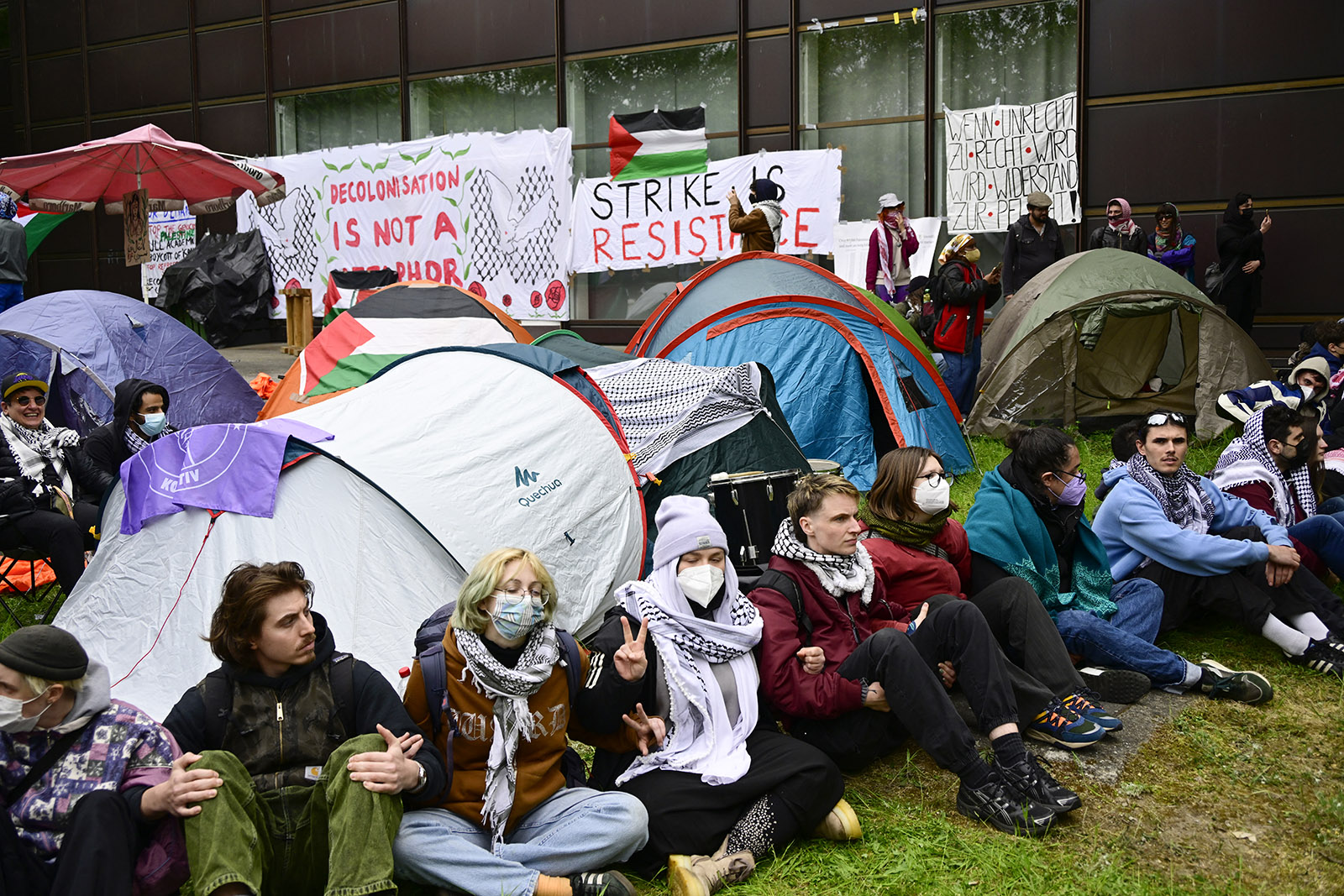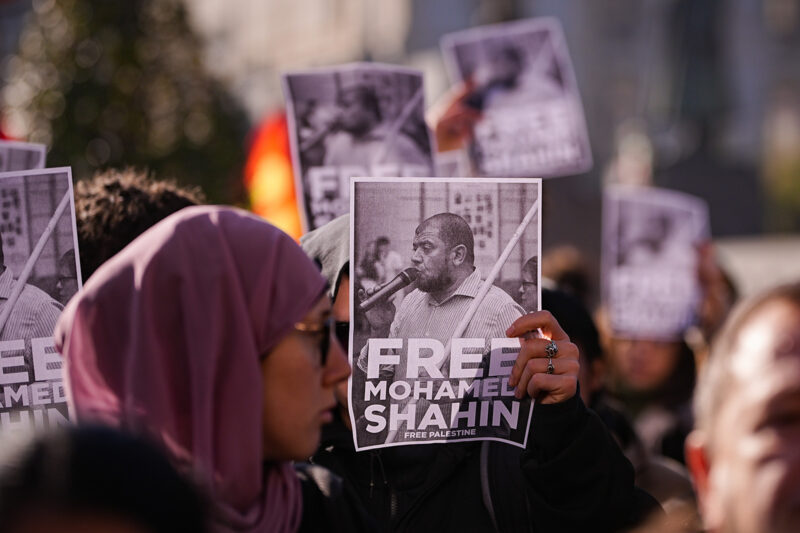Are Germany’s efforts to silence pro-Palestine voices through legislation legal?
Human rights experts raise warnings about bans, laws and deportation efforts targeting German critics of Israel’s military activity

A growing number of lawyers and human rights experts across Europe are warning that Germany’s efforts to use legislation to silence pro-Palestine voices may be threatening fundamental rights and stretching the bounds of both German and EU law.
Since the dramatic escalation of Israel’s military operations in Palestinian territories following the 7 October attacks, the German government has taken steps to criminalise the expression of support for Palestine, including attempts to deport activists for taking part in pro-Palestinian protests and plans to strip German citizenship from “antisemites and terror supporters”.
Carolus Grütters, senior researcher at the Centre for Migration Law at Radboud University in the Netherlands, is one of many legal and human rights experts warning that these steps are threatening freedom of expression. “It more or less shuts down all the types of discussions that we want to have within a democratic society,” Grütters said.
On 13 May 2025, the European Legal Support Centre (ELSC), collaborating with the research group Forensic Architecture, published its Index of Repression: a database on the systematic repression of Palestinian Solidarity in Germany. It documents more than 750 incidents involving cases pro-Palestinian activists and speakers since the beginning of 2019 including arrests, legal threats and censorship carried out by police, politicians and public institutions.
Incidents clearly spike following the 7 October Hamas terror attack and Israel’s military retaliation. Shortly after the attack, the German government pursued prosecution of activists for chanting “from the river to the sea”: a slogan which some see as a call for the abolition of the state of Israel and which Palestinian activists argue expresses hope for an independent Palestine. Berlin police then applied restrictions on demonstrations and bans on protestors chanting in foreign languages, including Arabic and Hebrew. Multiple cultural events featuring speakers critical of Israeli government policy were cancelled, including two planned talks in February 2025 by the UN’s special rapporteur on the occupied Palestinian territories, Francesca Albanese.
In March, four activists — one US, one Polish and two Irish citizens — received notice from Berlin’s state migration authority ordering them to leave Germany having attended a sit-in at a university.
Hyphen spoke with legal and human rights experts to understand whether these actions taken by German authorities are in themselves legal.
What does the data tell us about the repression of pro-Palestine activism in Germany?
The Index of Repression, created by the ELSC and Forensic Architecture, has so far tracked 766 cases of repression across Germany since 2019, when the ELSC was founded. The website shows how these incidents have increased since October 2023, with Berlin alone reporting 342 incidents.
The cases are divided into eight categories. The most commonly reported is censorship, disinformation and smear campaigns against activists, with 175 incidents. Other categories include arrests/law enforcement intervention (155 incidents), legal/financial/professional repercussions (137), harassment/violence/surveillance (107) demonstration bans/cancelled events (88), threats of legal action (70), threats to employment or funding (17) and sanctions at schools, universities or workplaces (17).
“One area where we’ve seen a lot of escalation is the criminalisation of certain speech,” said ELSC monitoring officer Sophia Hoffinger, which began with a ban on the slogan “from the river to the sea, Palestine will be free” by the Berlin prosecutors’ office on 13 October 2023. In the following months, some administrative courts ruled the phrase was ambiguous and could not be interpreted as support for terror groups, while others judged that if it was chanted shortly after 7 October, it could automatically be viewed as support for Hamas’s atrocities. In a prohibition order issued on 2 November 2023 the German ministry of the interior classified “from the river to the sea” as a slogan of Hamas and Samidoun, both designated terror groups. Anyone chanting the phrase can now be investigated as a supporter of a terror group and may be prosecuted as severely as someone displaying a Nazi swastika.
Hoffinger argues that Germany’s strict anti-hate speech laws are also being exploited by authorities, raising the example of a German protestor fined €1500 in April for holding a sign saying “Haven’t we learned from the Holocaust?” A Berlin criminal court ruled that the poster trivialised the Holocaust, which is against the law in Germany.
In February 2025 Berlin Police banned the use of Arabic at pro-Palestine demonstrations, and in April 2025 a protester was detained by police for speaking Irish at a pro-Palestine rally outside the Irish embassy in Berlin. Police justified the bans arguing that foreign languages pose a security threat. Under the terms of the Berlin Freedom of Assembly Act, protests can be restricted on public safety grounds.
“I think [repression] is being used to make people feel scared to go on the street and show solidarity,” Hoffinger said.

Is it legal for Germany to deport EU citizens?
In January, four activists — Cooper Longbottom, a 27-year-old US citizen, Kasia Wlaszczyk, a 35-year-old Polish national, and Irish citizens Shane O’Brien, 29, and Roberta Murray, 31 — received letters from the Berlin senate informing them that they could not remain in Germany. Longbottom’s student visa was revoked. All four were accused of spreading “antisemitic hatred and incitement” as well as “anti-Israeli hatred” alongside criminal acts including resisting arrest, property damage, disturbing the peace and insulting a police officer during a sit-in at Free University Berlin in October 2024. None have been convicted.
Two months later, their lawyers received letters from Berlin’s state migration authority saying they should leave the country by 21 April or be forcibly removed. In early May, the Berlin administrative court temporarily lifted their deportation orders, ruling they can stay in the country until the merits of their case have been decided on.
Grütters said an attempt by an EU country to deport foreign nationals with legal right to remain who had not been convicted of any crime is unusual. “I would expect that there would first be a trial,” he said. Deportation or an entry ban would usually be ordered by a judge as part of a sentence after someone had been found guilty, he added.
Grütters described the deportation of people without trial as “clearly against the rule of law.”
Can Germany remove citizenship?
On 6 May, following weeks of negotiations, the CDU officially formed a coalition government with the centre-left Social Democrats (SPD). A leaked working group paper on migration drawn up by the two parties revealed plans to “examine under constitutional law whether we can revoke the German citizenship of terror supporters, antisemites and extremists who call for the abolition of the free and democratic basic order, if they hold another nationality”.
Dual citizenship was only recently introduced to Germany in June 2024. The legislation, which allows residents to hold both German and foreign citizenship, forced through parliament by the SPD as part of the previous coalition government, was opposed by the CDU, then in opposition.
Elad Lapidot, professor of Jewish thought at the University of Lille, France, fears that the threat of revoking citizenship would be used disproportionately against Arab and Palestinian communities. “Removing citizenship is one of the worst things you can do to someone,” said Lapidot, whose family were stripped of their German citizenship under the Nazi regime. He warns that, as well as removing basic rights from people who have built lives in Germany, such a measure would make it incredibly easy to deport them. “This is what it is meant to allow — sending them away from a place that is their home.”
It is not yet clear how the CDU-SPD will define antisemitism or support for terror organisations. The government recently reaffirmed a resolution to use the International Holocaust Remembrance Alliance (IHRA) definition of antisemitism, which includes “denying the Jewish people their right to self-determination, eg, by claiming that the existence of a state of Israel is a racist endeavour”. This categorisation has been criticised by academics and human rights groups for conflating criticism of the Israeli government with antisemitism. Lapidot describes the IHRA definition as “too wide, too open to interpretation, and covering many acts that are actually legitimate criticism of the politics of the state of Israel”.
 Newsletter
Newsletter













